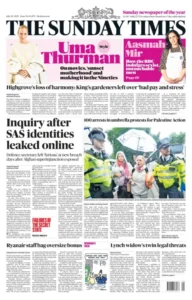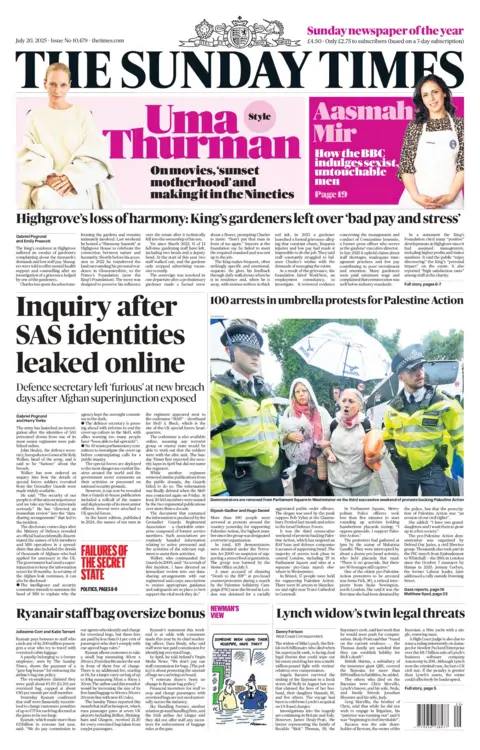The recent incident involving the leak of Special Air Service (SAS) identities has triggered significant concern within the British defense establishment. An investigation has been launched into this serious breach of security, which has left Defence Secretary John Healey reportedly “furious”. This situation is further amplified by various reports emerging from different news outlets, each providing updates and perspectives on the matter.
The Sunday Times highlights the gravity of the leak, underlining how such breaches pose immense risks to national security and the safety of operatives. The newspaper noted that the leak coincided with a significant event, describing how “100 arrests in umbrella protests for Palestine Action” occurred. Images accompanying the report depict two women being escorted by police officers under umbrellas, emphasizing the intersection of social activism and pressing national issues.
Another story that garnered media attention involves the King’s residence at Highgrove, which reportedly faced an “exodus of gardeners.” Criticisms surrounding the monarch’s demands alongside low staff pay have surfaced, leading to dissatisfaction among the royal workers. Interestingly, despite these grievances, a statement from the King’s Foundation cited “high satisfaction rates” among staff, drawing a complex picture of morale and management within royal establishments.
Moving on to broader societal issues, the Daily Mirror captured the anguish of Doreen Lawrence, the mother of Stephen Lawrence, who was murdered in 1993. In an exclusive interview, she cries out for truth regarding her son’s murder as the parole hearing of one of his killers approaches. The headline “Tell the truth on my son’s murder” denotes her fierce advocacy for justice. Meanwhile, the Daily Mirror also covered another poignant story regarding celebrity chef John Torode’s wife, Lisa Faulkner, amplifying the human stories that contribute to public discourse.
In lighter news, the Daily Star has taken a cheeky angle, coining the term “brat & groom” in response to pop star Charli XCX wearing white at a public event. The coverage also features actor Danny Dyer, who is quoted calling for more representations of working-class leaders, describing Sir Keir Starmer as a “non-entity.” Such headlines reflect the publication’s penchant for sensationalism mixed with social observation.
On the economic front, the Daily Telegraph sparked discussions with its headline “Middle class face higher water bills.” The report advocates for Labour MPs to consider implementing a nationwide scheme that could alleviate financial pressure on poorer families by providing significant discounts on their charges. Additionally, it mentions the government’s new Relationships, Health and Sex Education (RHSE) curriculum, which controversially states that “feeling down” is not classified as a mental health condition, stirring debates about the understanding of mental health in educational institutions.
Meanwhile, Chancellor Rachel Reeves was in the news for potentially benefiting from a £5bn windfall through seized Bitcoins, intended to address gaps in public finance—an issue that underscores the critical nexus of technology and fiscal management in modern governance.
As the narratives unfold, the Mail on Sunday touched on matters of national security surrounding the actions of National Security Adviser Johnathan Powell, suggesting his firm is involved in clandestine operations funded by taxpayers—a revelation that has prompted calls for deeper inquiries by the Tories.
Concurrently, the Sunday Express unveiled alarming figures about “NHS ‘tourists'” reportedly costing the National Health Service £200 million over the past five years, sparking discussions about the financial sustainability of the healthcare system amid rising costs and demands.
In conclusion, the range of topics covered across the British media encapsulates the multifaceted challenges the country faces—from critical national security issues and calls for justice to social equity concerns and economic policies. Each story holds the potential to influence public opinion and policy direction, making these discussions vital to understanding contemporary UK society. The intertwined narratives demonstrate not only the complexity of current events but also the public’s engagement with these crucial issues.











